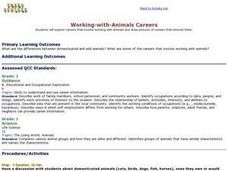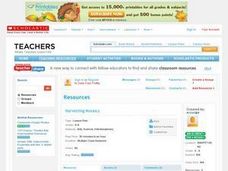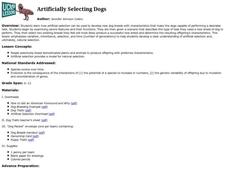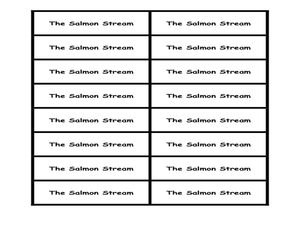Curated OER
Basics of Environmental Science
Ninth graders explore environmental concerns of the community and identify the basic needs of people, wildlife and domestic animals. Working both individually and in groups, they also define natural resources and compare and contrast...
Curated OER
What's Wild
Third graders discover the differences between wild and domestic animals. In this animal lesson, 3rd graders chart the differences in the animals and look through magazines for pictures of wild and domestic animals to glue to a poster....
Curated OER
Are you an Animal Sleuth?
Students define and identify both wild and domestic animals as well as mammals and non-mammals. In this animal safety lesson, students distinguish between animals that can carry rabies from those that cannot. Students use stuffed animals...
Agriculture in the Classroom
A Rafter of Turkeys
How did that turkey get from the early Aztec culture to your table? Learn about the history of wild and domesticated turkeys in North America, as well as their inclusion in Thanksgiving traditions, with a two-part agricultural science...
Curated OER
Wild Or Domestic?
Students discuss differences between wild and domestic animals. They list animals on chart paper, and then cut out pictures from magazines to create large collage showing wild and domestic animals.
Curated OER
Taming the Wild Aurochs
Sixth graders read and discuss the domestication of animals in history. In this Aurochs reading lesson, 6th graders define vocabulary and list similarities and differences between wild and domesticated animals. Students complete an...
Curated OER
Wildlife Conservation I
Focusing on the wildlife in their area, learners identify endangered and threatened species and what these animals need to survive. While this lesson involves animals in the Long Island area, it could be adapted for use with any area.
Curated OER
Domestic or Circus Animals
Pupils categorize animals into domestic and circus animals. Using strips of paper with animal names, they match a photo with the animal's name. They practice their pronunciation by reading sentences they have created to the class.
Curated OER
Animals Active at Night
Young scholars identify animals that are active at night and the reasons why. They examine the features needed to be a nocturnal animal. They create a representation of one of the animals.
Curated OER
Wild Dog Urine
Students investigate biology by researching wild animals. In this animal extinction lesson plan, students research African wild dogs and discuss the impact of the environment on their survival. Students read and analyze an article titled...
Curated OER
What's Wild?
Third graders define domesticated animal and wildlife. In this animal lesson, 3rd graders cut pictures out of magazines of both types of animals and make two collages with the pictures.
Curated OER
Basic Animal Behavior in Domesticated Animals
Students investigate animal behavior, examining the nervous system and the physiology of the brain and the fight or flight response. They simulate animal behaviors and discuss the difference between an instinct and a behavior.
Curated OER
LIONS and TIGERS and BEARS. . .Oh My! Animals of Connecticut and the World
Young scholars identify and list the different types of pets owned by the children in the class.
They graph the total number of each type of pet owned. They draw or cut-out a picture of an animal. Using the materials listed above, the...
Curated OER
Classifying Dog Breeds
Young scholars classify dog breeds. In this animal science lesson, students research various breeds of dogs on the Internet and classify breeds into small, medium, and large breeds. Young scholars illustrate their classification notes...
Curated OER
From Wolf to Dog
Students explain how dogs evolved from wolves based on the video. In this biology lesson, students research about breeding animals for specific traits. They interview dog owners and create a presentation about the dog.
Curated OER
Animal Rights Vs. Animal Welfare - Understanding the Issue
Pupils explore the difference between animal rights and animal welfare. They take a field trip to a farm to explore the producing animals for human use. After researching and collecting information from animal welfare/rights...
Curated OER
The Taming of the Few
Students consider the cultural, historical, and social implications of domesticating animals as pets. They create informative posters of various animals, illustrating their histories as pets.
Agriculture in the Classroom
Build it Better
If you think you can do better, feel free to give it a try. Pupils learn about the work on Temple Grandin and consider ways to improve animal handling facilities. They work in groups to build models to showcase their ideas.
Curated OER
Working-with-Animals Careers
First graders list and discuss careers that involve working with animals and draw pictures of careers that interest them. They compare and contrast domestic and wild animals.
Curated OER
What Makes a Cat a Cat?
Students investigate the lives of pets by videotaping them. In this animal life lesson plan, students videotape a cat and other pets using school cameras in a computer lab. Students review the footage from the cat and other...
Curated OER
The Fable of Franny And Her Fabulous Fainting Goat
Mix the art of reading comprehension with the skill of telling time. Children in grades two and three will discuss the importance of goats throughout history based on the provided background information. They'll create cute goat...
Curated OER
Harvesting Mosaics
Students use pieces of farm pictures to investigate the elements of art. In this farm art lesson, students use pieces of pictures to create an original artwork. Students use the Internet to find images. Students create a...
University of California
Artificially Selecting Dogs
Selective breeding has resulted in some novel and beautiful or useful dogs over the years. Using the American Foxhound as an example, genetics learners find out how and why they came about. Then, in small groups, they select breeds to...
Curated OER
The Salmon Stream and Vegetation
Students explore the ecosystem and food chain by researching Pacific Salmon. In this fish habitat lesson, students discover the life cycle for salmon, where they spawn and what they eat to survive the harsh elements. Students participate...

























